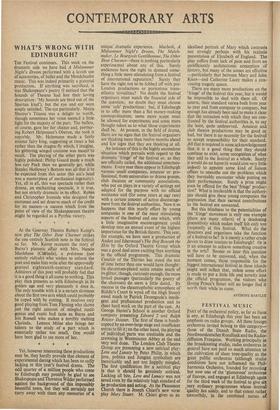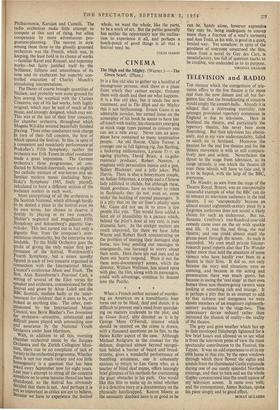FESTIVAL MUSIC
PART of the orchestral policy, as far as there is any, at Edinburgh this year has been an emphasis on radio groups. All three foreign orchestras invited belong to this category— those of the 'Danish State Radio, the Nordwestdeutscher Rundfunk and the Radio- diffusion Francaise. Working principally in the broadcasting studio, radio orchestras in general have not paid so much attention to the cultivation of sheer tone-quality as the great public orchestras (although studio conditions have not influenced the Phil- harmonia Orchestra, founded for recording but now one of the 'glamorous' orchestras of Europe, and engaged at Edinburgh again for the third week of the festival to give six very ordinary programmes whose festival quality lies solely, and to that extent rather unworthily, in the combined names of
Philharmonia, Karajan and Cantelli. The radio orchestras make little attempt to compete at this sort of thing, but often compensate by more adventurous pro- gramme-planning. The nearest in style among these three to the glossily groomed orchestras was the French, which was, in keeping, the least bold in its choice of works —familiar Ravel and Roussel, and repertory works—but fairly justified itself by the brilliance, fullness and smoothness of its tone and its exuberant but superbly con- trolled execution of Charles Munch's stimulating interpretations.
The Danes of course brought quantities of Nielsen, and probably won some ground for him among the sceptical with the Clarinet Concerto, one of his last works, both highly original, which may be said of much of his music, and strongly designed, which may not. This was at the last of their four concerts, for chamber orchestra, throughout which Mogens Wodike secured beautifully finished playing. Three'other conductors took charge in turn of their full concerts, the first of which opened the festival. In this, in spite of a competent and musicianly performance of Prokofiev's Fifth Symphony, neither the orchestra nor Erik Tuxen its chief conductor made a great impression. The German Orchestra's three programmes, all con- ducted by Schmidt-Isserstedt, were a slightly too catholic mixture of war-horses and un- familiar modern music (including Strav- insky's Symphony 1945, finely played), calculated to have a different section of the audience restless in each work.
Most enterprising of all the orchestras is the Scottish National, which although hardly to be denied a place in the festival even on its own terms, has chosen to deserve it doubly by playing at its two concerts, Mahler's neglected and magnificent Fifth .Symphony and Schoenberg's gigantic Gur- relieder. This last turned out in fact only a gigantic flop, from the composer's over- ambitious immaturity, but the enterprise was laudable. To the Halle Orchestra goes the Credit of giving the only major first per- Lormance of the festival, Wordsworth's Fourth Symphony, but a minor novelty figured in each of two concerts organised in Connection with the International Music Council's conference Music and Youth. The first, Alan Rawsthorne's Practical Cats, a setting of several of the Eliot verses for Speaker and orchestra, commissioned for the festival and given by Alvar Lidell and the BBC Scottish, misfires badly as the 'enter- tainment for children' that it aims to be, or Indeed as anything else. The other, com- missioned by the International Music Council, was Boris Blacher's Two Inventions 'fi?r orchestra—attractive, substantial and difficult pieces played with astounding ease and assurance by. the National Youth Orchestra under Jean Martinon.
With, in addition to all this, morning Chamber orchestral music by the Jacques Orchestra and the Zurich Collegium Musi- elatt, there can be no complaint of lack of Variety in the orchestral programme. Whether there is not too much variety and too little homogeneity is a question that has been asked every September now for eight years. Last year's attempt to string all the concerts Somehow on to some tenuous thread has been abandoned' so the festival has obviously decided that there is not. And perhaps it is _not so important as critics are apt to believe. Because we have to experience the festival
whole, we want the whole, like the parts, to be a work of art. But the public generally has neither the opportunity nor the inclina- tion to experience it all, and perhaps a hotch-potch of good things is all that a festival need be.
COLIN MASON



































 Previous page
Previous page